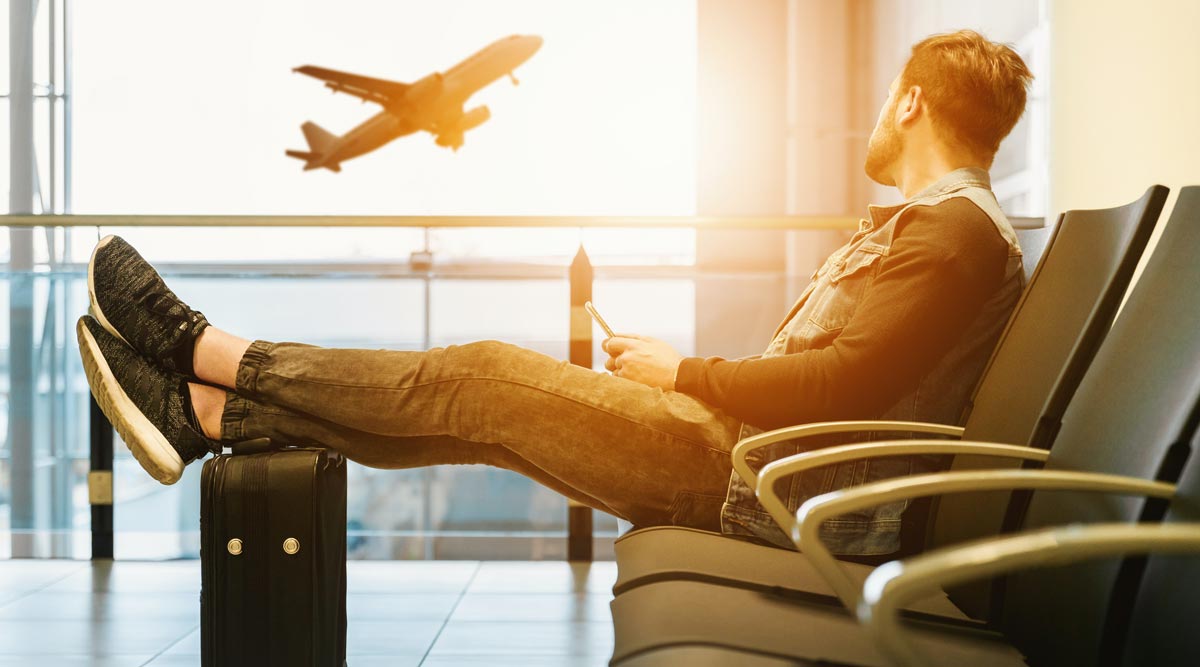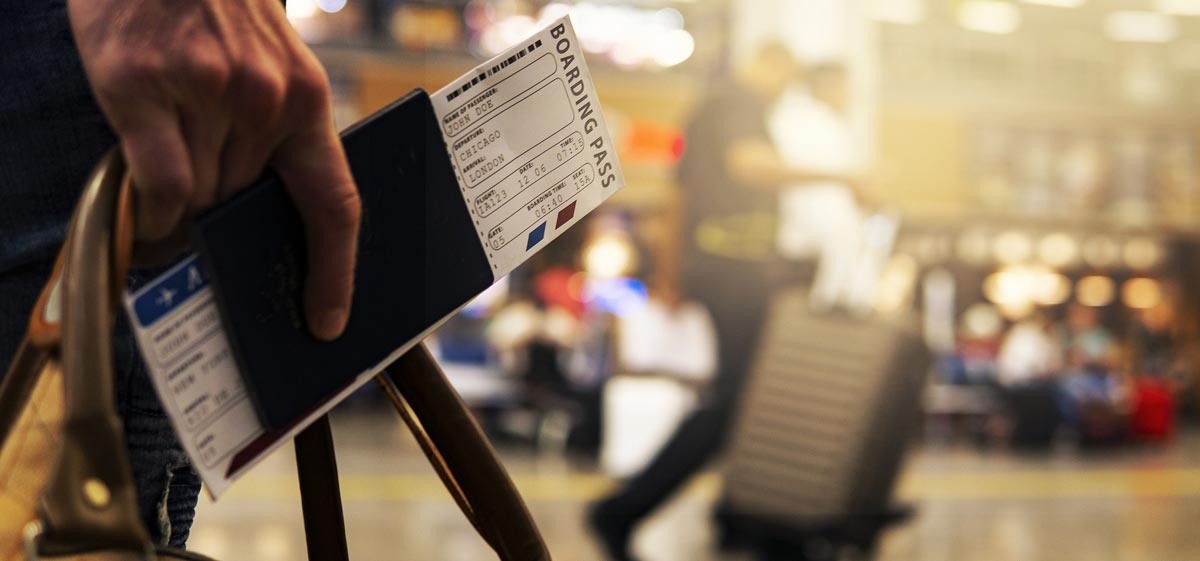
Allow me to set the scene: You have been preparing for your long-awaited travel all week, rushing to get everything ready for your early-morning flight. You are already worn down and to make sure you get the most out of your trip, you want to avoid being jet lagged. Learn more about how you can prevent and treat jet lag on your next journey.
What is Jet Lag?
Jet lag is a temporary condition that can occur when traveling long distances across different time zones. It causes physical and mental fatigue due to the disruption of one’s sleep cycle, which makes it difficult to adjust to the new environment. Jet lag severity depends on several factors, such as the number of time zones crossed, the direction of travel, and individual physiology.
The best way to avoid jet lag is to adjust your daily schedule to the new time zone before you leave. This means gradually shifting your bedtime and wake up times a few days before your trip, as well as getting plenty of rest while on the plane. You should also stay hydrated throughout your journey and take short naps during the day. Additionally, it is important to get outdoors for some natural light and fresh air to help reset your body clock. Finally, listen to your body and adjust as needed.
Common Symptoms of Jet Lag
Difficulty Sleeping
Jet lag affects the body’s natural sleep cycle, making it difficult to fall asleep and stay asleep during the night. This can lead to exhaustion during the day, as well as difficulty concentrating and staying alert.
Exhaustion
Since jet lag disrupts your sleep cycle, you may feel extremely tired during the day when you should be feeling alert and awake. This can also lead to difficulty focusing on tasks, as well as grogginess and fatigue.
Mood Swings
Jet lag can cause mood swings due to shifts in sleep cycles and the body’s hormones. You may find yourself feeling irritable, anxious or depressed when experiencing jet lag.
Digestive Problems
Jet lag can cause digestive issues such as constipation, nausea and loss of appetite due to shifts in diet, circadian rhythms and time zones. This can lead to uncomfortable symptoms such as bloating, cramping and indigestion.
How Long Does Jet Lag Last?
Jet lag can be a pesky problem for travelers of all kinds. It disrupts your body’s natural clock and can cause fatigue, disorientation, lack of focus and other issues that can impede on the enjoyment of your trip. But how long does jet lag actually last?
The answer depends on several factors such as how far you traveled, the time difference and your age. Generally speaking, jet lag can last anywhere from a few days to a week or more. You’ll feel worse when you travel east than west because it will be harder for your body to adjust to the new schedule.
When traveling long distances, there are ways to minimize the effects of jet lag. Adjusting to the new time zone before you leave can help, as can getting plenty of rest and light stretches while on the plane. Staying hydrated can also be beneficial, as dehydration makes jet lag worse.
If all else fails and you find yourself suffering from jet lag upon arrival, there are a few tricks you can try to help you adjust. Taking short naps during the day, eating meals at regular intervals and avoiding large meals late in the evening can all help. Getting outdoors for some natural light and fresh air is also helpful for resetting your body clock.
No one likes dealing with jet lag, but it is a fact of life when traveling across different time zones. Being aware of how your body responds to jet lag and how long it may last can help you plan ahead in order to make your travels more enjoyable.
Jet Lag Calculator
In order to get a more accurate estimation of how much sleep you will need in order to combat your jetlag, use a jet lag calculator. This will help to better plan for a more successful trip and recovery upon your return.
Do Pets Get Jet Lag?
While it isn’t quite as common for pets to experience jet lag, it is still possible. Pets may feel disoriented and have difficulty adjusting to the new environment when traveling long distances, though usually not to the same extent as humans. However, they can still be affected by changes in temperature and humidity levels that come with flying.
To help your pet adjust to the new time zone and environment, make sure they are well-rested before and during your flight. Offer them light exercise if possible, such as taking a walk or playing indoors. You should also try to stick to their normal feeding schedule as much as possible and ensure they have access to water throughout the journey. Make sure to give them ample time and space to adjust to their new environment, allow them access to familiar items such as toys or blankets, and provide them with plenty of love and reassurance.
In most cases, your pet will have adjusted to the new time zone and environment within a few days. If they’re still having trouble adjusting after that, it may be helpful to consult with a veterinarian or animal behavior specialist for advice.
Overall, although pets can experience jet lag just like humans, it is usually not as severe and is usually resolved within a few days. With some planning and patience, you can help your pet adjust to the new surroundings and get back to their normal routine.

How to Get Over Jet Lag
Getting over jet lag quickly is possible with the right strategies. Here are some tips to help you adjust more quickly and easily:
Stick to a Schedule
It’s important to stick to a regular schedule, as this will help your body adapt more quickly to the time zone change. This means going to bed and waking up at the same times, eating at designated times, and taking short breaks during the day to rest.
Get Outdoors
Sunlight and fresh air help to reset your body clock. Taking a walk or simply sitting in the sun can make a world of difference when it comes to adjusting to a new time zone.
Avoid Caffeine and Alcohol
Caffeine and alcohol can disrupt your sleep patterns, making it more difficult for your body to adjust to the new time zone. Try drinking plenty of water instead and you should start feeling more alert in no time.
Adjust Your Meals
Eating at the right times can make a huge difference when it comes to adjusting your internal clock. Try eating breakfast, lunch and dinner according to your new time zone’s meal times and you should start feeling more in sync with your surroundings.
Jet Lag Supportive Therapy & How to Avoid Jet Lag
IV Nutrition and Hydration
Reality is, often when traveling, we don’t slow down enough to eat or drink right, which contributes to jet lag. Taking time to have an IV hydration nurse come to you via mobile IV hydration or stopping by a Liquid Mobile IV clinic can help you get ahead of your body’s hydration and nutritional needs.
Sleep Supportive Therapy
Getting the right amount of sleep is key to avoiding jet lag and getting your body back in sync with its new time zone. If you have trouble falling asleep, try taking a warm bath or engaging in some light stretching before bed to help relax your muscles and induce sleep.
Light Exposure Therapy
Exposing yourself to bright light during the day can help reset your body clock and reduce fatigue. Invest in a special light therapy lamp or simply take some time to go out in the sun for a few minutes each day.
Hydration Therapy
Staying hydrated is essential when it comes to avoiding jet lag. Make sure to drink plenty of water throughout the day and avoid caffeinated or alcoholic beverages.
Diet Therapy
Eating well is also essential when it comes to avoiding jet lag. Try to stick to a healthy diet with plenty of fruits, vegetables, and proteins while avoiding processed foods and added sugars. This will keep your energy levels up and help you adjust more quickly.
IV Therapy for Jet Lag
Liquid Mobile IV offers many services to aid in every step of your wellness journey. The Fatigue and Jet Lag treatment is great for combatting fatigue, improving mental clarity and regulating circadian rhythm as well as many other benefits. This IV hydration infusion helps strengthen your immune system while also counterbalancing the loss of fluid that can be caused by the low humidity from flying.
Although jet lag can be an annoying side effect of traveling, there are many steps you can take to prevent it all together. Keep in mind that everyone is different, so it’s important to listen to your body when trying to manage jet lag either through IV hydration prior to travel, after travel or a combination of both. With some planning and patience, you should be able to make your way through it and enjoy the rest of your trip as well as your return home!
